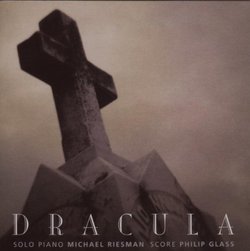Even better than best
Jacques COULARDEAU | OLLIERGUES France | 09/20/2007
(5 out of 5 stars)
"Composed for the 1931 "Dracula" by Tod Browning. In this CD the music has been arranged for solo piano by Michael Riesman. Listening to that music gives an amazing feeling. It is composed to accompany and follow a film and yet, without the film we follow the dramatic tension of a drama behind, beyond. The music can stand by itself. And the first characteristic of film music is obvious here. It cannot be well-tempered because it has to follow the rhythm of the film, of the editing, and the tempo is constantly changing from one sentence to the next even when the theme is the same, when it is a variation on the previous sentence. Film expressivity for music means that ill-tempered aspect, especially a thriller of any type because such a film has to break the rhythm of the tale all the time with frightening and intense elements. It also means constant variations in power and the blending of a theme into another like any sequence elliptically merges into or delivers the next one, just like a sequence elliptically merges and separates from the previous one. Very few films nowadays have a continuous music on their sound tracks. The old scores of mute films were often very repetitive. Here Glass manages to get some constant coloration with some repetitive elements from the left hand on the piano, but then he widely uses the right hand to break it, to jump beyond and multiply the richness and blooms of the music. And it is very interesting to see (track 8) how the left hand has the common rhythm and then the right hand provides a second rhythm that takes over, superimposes itself like a character strutting on a stage and in a setting that surrounds him and yet in which he does not get lost. The most admirable aspect of this music composed in 1999 is that, beyond its stand-alone-ness, the great variety that is constantly accompanying the great continuity and uniformity in tone, is just like a continuo behind all the foreground compositions and arias or solos. In other words he rediscovers the basic element of medieval music based on a continuo to sustain and support or even carry the voices and their variations. This is most clear in tracks 16 and 17 in which Renfield is evoked in his two dimensions: his "craze" and his "cell", and in track 17 he also rediscovers the "Mannheim-ese" descending and ascending scales but with a modern twist, that of the coloration created behind by the left hand. Or think of track 18, the dream with the right hand and the sleeping night with the continuo of the left hand, and both are not even on the same tempo. But what power when the two hands come together and play on the same tempo they can hammer into our vision like in track 23 when Dr Van Helsing confronts Dracula, the two being one in the confrontation. The Epilogue is like making the left hand toll the bells of death in a slow rhythm that is run over by a faster rhythm, that of the right hand of life. Beautiful ending.
Dr Jacques COULARDEAU, University Paris Dauphine, University Paris 1 Pantheon Sorbonne & University Versailles Saint Quentin en Yvelines
"
...skip the kronos recording and go with this.....
L. Steidl | NYC | 07/07/2007
(5 out of 5 stars)
"...brilliant piano transcription of the powerful Glass score for 1931's "Dracula".......playing which simply rocks the senses with it's power and subtlety....i find it so much more "definitive" than the original recording made with the Kronos Quartet...always found their interpretation oh-so screechy and monotonous...never could get through it, even when accompanied with the visual of the film......hearing this version made me re-evaluate this wondrous music as if hearing for the first time...
Luigi ~ nyc"


 Track Listings (27) - Disc #1
Track Listings (27) - Disc #1
